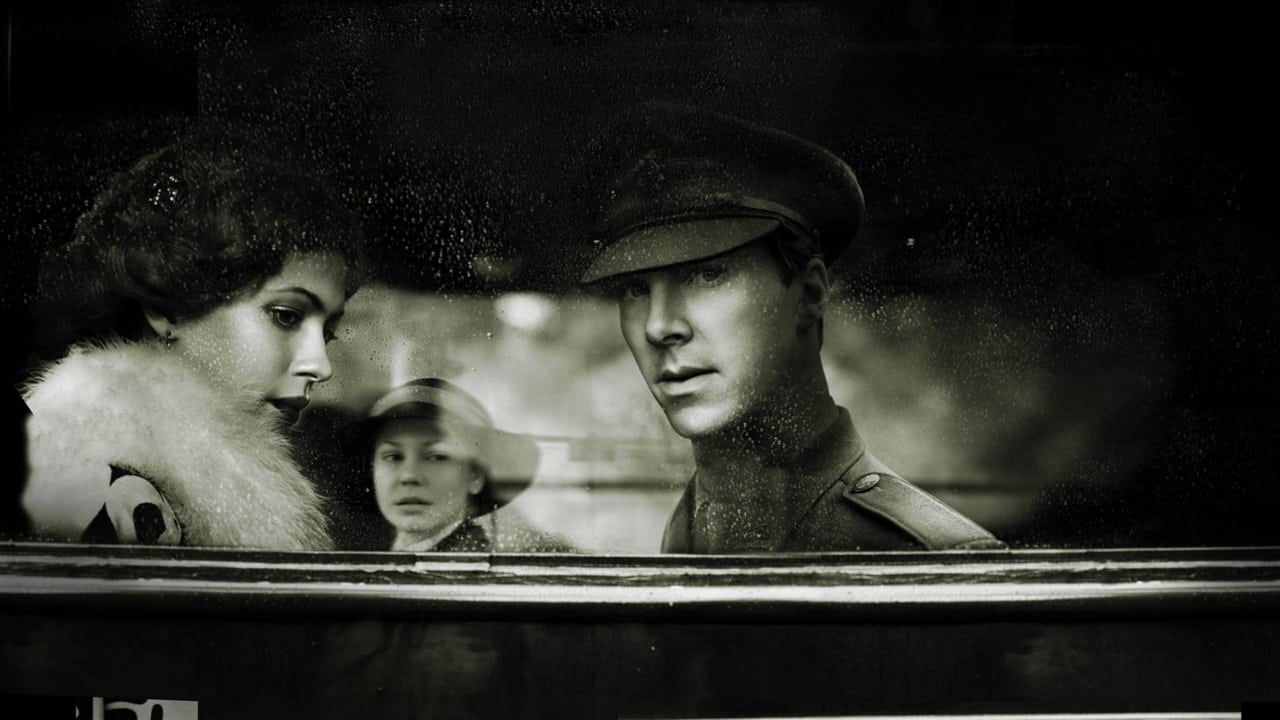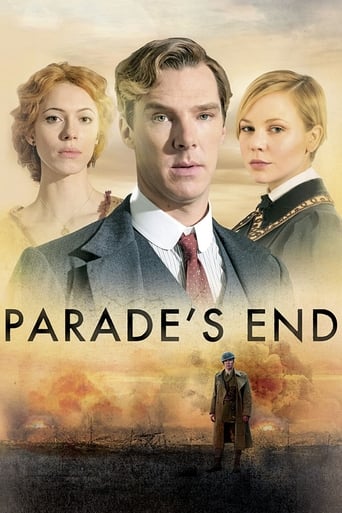

No spoilers here at all! I love Rebecca Hall and I enjoy Cumberbatch a lot, so together in a film? Dreamy. This is the same era as the first season of Downton Abbey, but the tone is vastly different. Much funnier and drier, which suits Cumberbatch. What doesn't suit him is the blond hair! Rebecca Hall has the same issue too. What were they thinking? I'm not sure why they wanted Cumberbatch to look like Dan Savage or James Wilby, but there you go. Not a good look. And Rebecca Hall usually has glorious dark hair. The light reddish color doesn't suit at all. I know this is minor complaint because the performances are fantastic, but it was very distracting.In short, a smart mini-series with a smart writer and smart actors. What's not to love?
... View MoreI'm sure that HBO marketing execs were relieved that, if they were going to get behind a 5-part series based on Ford Madox Ford's complex and not terribly well known 20th-century masterpiece, at least some of it would be set in a stately home in the north of England, like that other show about the downtown abbey. Ford's a great one for interior monologue and multiple points of view and such, but Tom Stoppard's masterly adaptation channels the great muddy river of his prose into a lively, involving narrative—though there's still enough time-shifting and flashbacking, even some Eisenstein-style montage, to do honor to Ford's avant-garde intentions. Considering what difficult material he's dealing with, it's one of the best TV adaptations ever! Benedict Cumberbatch has always done well in period films, and he seems like the only possible choice for Christopher Tietjens, a self-styled 18th-century gentleman (the time period of the series is roughly 1908-19) and omniscient civil servant, but obstinate, brusque and arrogant as well (maybe even a little like Sherlock?). Rebecca Hall is riveting and surprisingly sympathetic as Tietjens's deceitful wife, Sylvia, and Aussie actress Adelaide Clemens is a revelation as Valentine, the virginal suffragette he meets and falls in love with in two of the series's most powerful scenes. (Tietjens and Sylvia, though usually at cross-purposes, are determined not to divorce—it's complicated .)Tietjens is described by one of his wife's admirers as a "bloody great bolster" of a man—BC didn't have time to bulk up for the part, obviously—but he emerges as a poignant, even romantic, figure, with only the memory of the night he falls in love with Valentine to sustain him through six years of frustration, disappointment and danger. Perhaps it's easy to see why some viewers didn't find this storyline or this character very "relatable."Long story short, '"Parade's End" isn't as accessible as an original costume drama devised for a contemporary audience, like "Downton," but it's decidedly worth watching. We didn't have a problem with BC's enunciation, but some of the dialogue, especially in the scenes with excited Welsh soldiers in the trenches, is admittedly not so easy to follow. (Next time we'll try the subtitles.) Great cinematography; kudos to the first-rate British cast, with special mention to Stephen Graham as Tietjens's fair-weather friend Macmasters and Rufus Sewell in a Pythonesque turn as a sex-crazed clergyman. An interview with Stoppard on disc two sheds some light on his process.
... View MoreThose of us who view Ford Madox Ford (called 'Fordie' by all his friends) as a heroic figure of 20th century literature and culture can only be thrilled that this series of his novels featuring the fictional character Christopher Tietjens has been so exquisitely and magnificently filmed for television in a five-part series. The screenplay by Tom Stoppard, whatever additional emphasis he may have added to the passion scenes (which disconcerted some purists), has done a wonderful job of adaptation. And Susanna White, perhaps best known for the series of Dickens's BLEAK HOUSE (2005), has worked miracles to bring alive this epic tale as if we are really there. These novels were previously dramatised in three episodes for the BBC, adapted by John Hopkins and directed by Alan Cooke, and broadcast in December of 1964 as part of the 50-episode drama strand entitled Theatre 625, which lasted from 1964 to 1968. One of the producers was Michael Bakewell, whom I used to know. The part of Valentine Wannop was played by Judi Dench, then aged thirty. Certainly it was better to have a much younger actress play that role this time around (Adelaide Clemens was 22 during the filming). This series really is British period drama at its best. I have never previously found Benedict Cumberbach so perfect in a part, and he has definitely learned at last to master his craft. This is his triumph, in the lead role of the stuffy but honourable Christopher Tietjens, the last of his kind, a man who believes in the code of the gentleman to the utmost extremes. Fordie used Tietjens to show up the hypocrisies, contradictions, intolerance, and wickedness of the social scene of which he had himself been such a conspicuous victim. Fordie's own intolerably bitter experiences in England forced him to remove himself to France, where he became one of the most conspicuous denizens of the Montparnasse scene, friend and co-editor with Hemingway, mentor of Jean Rhys, and benefactor of countless famous literary figures and colleagues. He was one of the most generous and kindly men of his time. And Fordie knew what it was to serve in the trenches in the First World War, in which he was severely wounded. For the rest of his life he wheezed as the result of his lungs being nearly ruined by poison gas inhalation. The only other work of Fordie to be filmed in the past was THE GOOD SOLDIER (1981), a wonderful dramatization by Julian Mitchell of one of Fordie's most famous novels, starring Jeremy Brett and Susan Fleetwood, which everyone who liked this series should instantly order on DVD, if they want an extra thrill. Let us hope that more of Fordie's works make their way to the screen now. The other day I read one of the novels which he wrote jointly with Josef Conrad and it was a spell-binder. In this series, we have the treat of seeing the role of Sylvia played by Rebecca Hall. She certainly captured the hearts of Britain at the age of ten when she starred in the wonderful drama series, THE CAMOMILE LAWN (1992), one of the finest drama series of the nineties, which was directed by her father, Peter Hall. That charming little girl has today grown into a willowy young woman of thirty, who is now a ravishing beauty and every bit as captivating as ever, as well as being a veteran of 24 titles. Here she is magnificent as a narcissistic and self-indulgent beauty spoilt by wealth and privilege, faithless but tormented. Who could have imagined that she could have been capable of showing such ravaged hauteur and such savage pride? What a job of it she has done! She alternates between moments of sweetness and insufferable arrogance more rapidly than any Tesla current. But the show is stolen by the amazing Adelaide Clemens, who now has enthusiastic fans stretching round many city blocks. This petite little thing, who badgered the producers for so long (and even flew to London to accost them in period costume) that they finally relented and gave her the part, has swept away the hearts of millions just as Rebecca Hall did when she was ten. Two such emotional creatures in one TV series is almost too much for one's equanimity. Clemens (same surname as Mark Twain, and perhaps also descended from the regicide Gregory Clement, MP, as he was) throws the small screen into disarray. Nothing would seem to suit her whirlwind performance but 70 mm, as her range of emotions just does not fit into a TV screen and spills out of the sides onto the carpet and comes at you, licking at your feet and threatening you with inundation. She is like an out of control dust-devil in the Mongolian desert, spinning dizzily and might go anywhere. When she and Tietjens meet, it is love at first sight, but many years must elapse before he can become the stillness at the heart of her storm. Despite the oafs and morons who run the BBC, so many of whom have recently resigned under pressure, and good thing too, the place really does turn out such fabulous drama, using the finest talents which Britain has to offer. This is certainly British television's equivalent of this year's Olympic and Paralympic triumphs. It records the lost world from before the First War, and how that world ended, of how the age of parades collapsed, so that there would be no more parades (NO MORE PARADES is the title of one of the novels in this series). But let us hope that PARADE'S END will be Fordie's new beginning. There are approximately a hundred other novels by him, several of them masterpieces. So start reading, everybody! And start with his four volumes of astonishing memoirs! We rediscovered Trollope some time back, and now it is Fordie's turn. Good old Fordie, how you deserve it!
... View MoreI read Ford Madox Ford's most celebrated novel "The Good Soldier" only last year and came to this dramatisation of his "Parade's End" with a good degree of expectation, tempered by some reservations about the anticipated over-writing by Tom Stoppard in bringing it to the small-screen. Reservations because I knew in advance that every character would be miraculously blessed with extreme loquaciousness, with almost no room for the plain everyday conversation that surely made even the Edwardian world go round, particularly in the trenches. Thus even ordinary soldiers in the heat of battle boast about their skill in translating sonnets into Latin pentameter, that most mundane of talents! At another point, Benedict Cumberbutch's Christopher Tiejens' character's young lover Valentine declares that their love is "like literature", which was probably the most opaque of a whole army (pun intended) of similarly opaque phrases proffered here.As for the characters, I found them too many and too shallow and callow. I couldn't imagine cold-fish Tiejiens having an impulsive stays-busting romp in a train carriage with the venal but voluptuous Victoria, who, we learn later, uses her soon-afterwards child-birth as the means to trap him into marriage, for a child who isn't his. Other characters come and go, a mixture of the snobbish, the eccentric and the parasitic, individuals amongst them often re-emerging at the least expected moment, which for my money didn't help the narrative.Acting wise, I found Cumberbutch underwhelming as the central character in the drama. He can do stiff upper lip crossed with pained guilt but little in-between. Rebecca Hall as his harlot of a wife does better as the promiscuous go-getter while Adelaide Clemens as his too obviously boyish-looking suffragette mistress never once appears natural and likewise fails to project her grand passion which supposedly outlasts the war.The war scenes themselves are magnificently rendered in their realism and horror. I just wish that some of that realism had extended deeper into this drama of upper-class nabobs the likes of which I couldn't give a damn about.
... View More